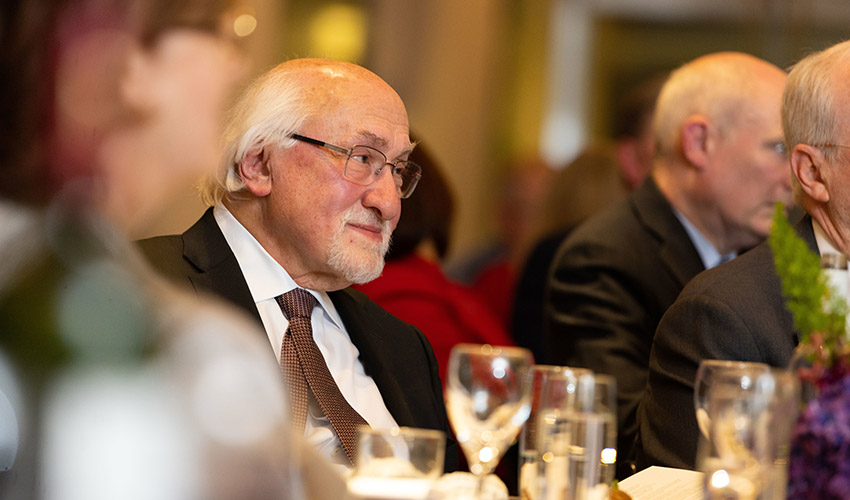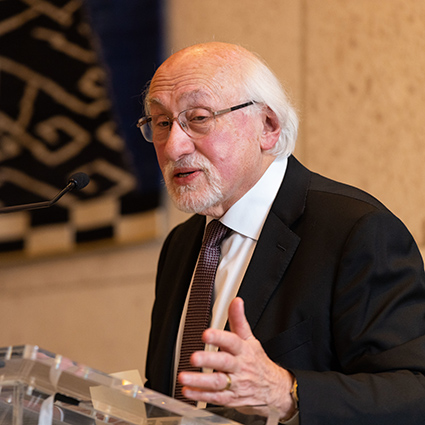 After a career that's spanned multiple states and leadership roles in education at every level, Samuel J. Meisels is retiring. The last 10 years of his career were spent building the Buffett Early Childhood Institute at the University of Nebraska from the ground up.
After a career that's spanned multiple states and leadership roles in education at every level, Samuel J. Meisels is retiring. The last 10 years of his career were spent building the Buffett Early Childhood Institute at the University of Nebraska from the ground up.By Erin Duffy
A groundbreaking new television show called “Sesame Street” was just being developed, with furry Muppets teaching kids to count and otherworldly characters talking about the letter of the day. Head Start, a new program serving preschool-aged children of families living in poverty, had launched and was beginning to capture the nation’s attention.
And in 1960s Boston, a young educator and graduate student named Sam Meisels was soaking it all in, inspired by the new science, theories, and energy being devoted to how young children learn—and why it was important to set them up for success early.
“There was a heightened sense of excitement about learning something no one else had paid attention to before,” Meisels said. “That’s what was going on all around me. There were so many opportunities to go out and make things, build things, learn about things, start programs, and try them out with children.”
More than 50 years later, after a career that’s spanned multiple states and leadership roles in education at every level from preschool to higher education, Meisels is retiring. He is leaving the Buffett Early Childhood Institute at the University of Nebraska 10 years after he arrived to build it from the ground up.
There is little debate: Meisels has left his mark on the world of early childhood education. He built minds. He built preschool programs. He invented assessments used all around the world. And his more than 200 research publications were intended to highlight the fact that nearly 90% of a child's brain growth takes place during the first five years of life.
Meisels’s work in early childhood began during that exciting, tumultuous period in the 1960s.
He was a would-be philosopher and graduate student at Harvard University whose carefully laid plans were derailed by a chance decision: at the urging of his future wife, Alice, he began volunteering a few days a week at a local preschool in Harvard Square.
“That really changed my life,” Meisels said. “I could see the theory I was learning being applied to real children and teachers, how complex that was, how intellectually challenging it was for me to comprehend, how much I had to learn, and how gratifying it was for me to spend time around kids.”
They would later name their daughter Reba after one of the little girls he met there.
He headed the Eliot-Pearson Children’s School at Tufts University, a laboratory where Meisels and his colleagues outfitted the playground with a boat and an old fire engine, and they built ladders and slides so children could learn through exploration and play with real objects. They could run, jump, and use their imaginations.
“I saw it as an opportunity to create basically the best preschool one could ever imagine,” he said. “Nothing was bought from a catalogue. Children don’t come from catalogues.”
 Samuel J. Meisels
Samuel J. MeiselsIn Brookline, Massachusetts, where he became a Kindergarten and first grade teacher while continuing his doctoral studies at Harvard, he answered a mother’s plea: could her son, who was born without lower limbs, attend Kindergarten with his peers? This was years before the Americans with Disabilities Act and other landmark special education legislation.
He’s very smart, she told Meisels, the class’s teacher.
“Well, I’d love to meet him,” Meisels said. “Bring him in.”
“After that I became a huge advocate of people with disabilities and began research with children who were included in regular classrooms,” he said.
At the time, Massachusetts had more progressive policies on classroom inclusion, then called “mainstreaming,” than most other states.
“But I didn’t do it because of that,” Meisels said. “I did it because it was the right thing.”
Meisels sees this as his introduction to supporting differences and diversity. Since then, issues of equity have played an increasingly important role in early childhood education and his work.
The opportunities, the career highlights, the plaudits continued to pile up.
As a professor of education and research scientist at the University of Michigan’s Center for Human Growth and Development, he and his colleagues launched longitudinal studies of the socio-emotional development of the tiniest babies in neonatal intensive care units—long-term hospitalized preemies weighing less than 2.5 pounds.
In Washington, D.C., he urged Congress to do away with standardized testing for Head Start students, believing that it was developmentally and culturally inappropriate. He created new assessments for young children based more on classroom observation than conventional test-taking. And as the president of Erikson Institute in Chicago, he raised funds to build a new campus and helped this graduate school in child development realize even more of its strengths.
In 2013, he arrived in Nebraska. He was Employee No. 1 at the Buffett Institute and crafted its oft-repeated goal: To make Nebraska the best place in the nation to be a baby.
He’s spent the last 10 years building the Institute’s staff and expertise and growing its state and national reach. He has urged superintendents to radically change their thinking: learning doesn’t begin when a child enters a Kindergarten classroom, but when a baby is born.
Under Meisels, the Institute unveiled two key priorities: closing the opportunity gap for Nebraska’s most vulnerable children and elevating the undervalued and underpaid early childhood workforce.
Meisels is proud of his accomplishments and grateful for his career. He notes the progress that’s been made since he began teaching a half-century ago: early childhood special education and intervention; renewed attention to the need for affordable, quality child care; growing awareness of mental health issues; engagement with families; increased understanding of the importance of equity and opportunity for all children; and greater access to health care.
But there is a level of frustration he can’t mask: why, after all these years, isn’t early childhood a higher priority for policymakers and politicians? Why are the pressing problems of the field—low pay and respect for teachers, high child care costs for families, a lack of state and federal funding, especially compared to K–12 education—seemingly no closer to being solved?
“I remember writing a paper probably around 1980 that people who cut our hair and take care of our dogs and park our cars make more money than those who take care of our kids,” Meisels said. “And it’s still true, or worse. The workforce behind the workforce—the people who make it possible for everyone else to work—are struggling. This is a tragedy and a disgrace.”
Did you know?
-
Sam loves classical music. “I do not own one disc by Taylor Swift or by Beyoncé, but I have thousands of discs of classical music … I own quite a few musical scores also, and I’ll follow the score and try to understand how this same piece by Bach can sound so different in the interpretation of two different musicians when the notes are exactly the same. It’s a big part of my inner life.”
-
He owned a Ninja Warrior-style gym in Massachusetts—his grandkids trained in the sport.
-
He started his career as a preschool, Kindergarten, and first grade teacher. “That is the foundation for all the work I did.”
In speeches, Meisels often talks about the “cognitive dissonance” that plagues early childhood education and development.
“We know how much brain development takes place in the first five years of life, and yet we ignore what we have to do in order to optimize that brain development,” he said. “I don’t walk away feeling failure. I walk away feeling deeply frustrated. But we are in process. We have not come to a conclusion. Although it’s partly a matter of money, it’s also a matter of what our society has gotten away with for so long. That must stop.”
He can’t understand why others don’t share his sense of urgency.
“Things are better now than they were, much better, but we are still far from where we need to be,” he continued. “We need to do much more so people everywhere will understand why they must accept nothing less than quality care and truly advocate for the best for all children.” That’s Meisels, friends and colleagues said. A champion of children to the end.
On March 1, he’ll turn over the keys to the Institute to Walter Gilliam, an endowed professor at Yale University and a leading expert in the education, health, and mental health of young children.
He and Alice will stay in Omaha, geographically sandwiched between their two children and five grandchildren on the East and West Coasts. They’ll finally have time to see all the art exhibits and symphony performances that have taken a backseat to Meisels’s work.
But what work it has been.
“I do walk away feeling really good and happy and incredibly grateful that I’ve been given this opportunity,” he said. “To me, what it comes down to is helping all kids fulfill their potential. That’s what it comes down to.”
Erin Duffy is the managing editor at the Buffett Early Childhood Institute at the University of Nebraska and writes about early childhood issues that affect children, families, educators, and communities. Previously, she spent more than a decade covering education stories and more for daily newspapers.
Have a comment, a question, or a story idea? Reach Erin at erinduffy@nebraska.edu